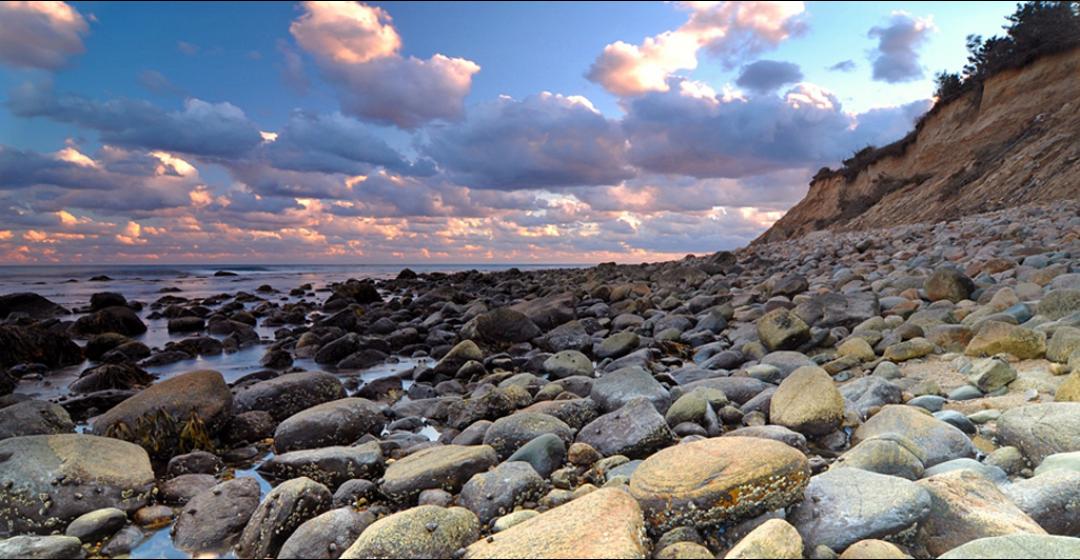In the fall of 2012, on my way to Berlin, Germany, I ended up on the Vineyard. My wife and I had been making European plans for months, but instead, through luck and timing, we found ourselves living in a winter rental in Edgartown. Like many, I’d grown up coming to the Island, and later came to stay for long periods as an adult to be with family and friends. Now it seems inevitable that I’d live here, but as a composer of contemporary classical and experimental music, I hadn’t given much thought to what it might mean to compose here. We were moving away from Brooklyn, London, Los Angeles – away from the cosmopolitan, urban culture where I’d been getting my work performed and noticed. But what music – what sort of music – would be evoked by where I now found myself?
Part of the answer came to me at Menemsha. Everyone knows that Menemsha is arguably the best place to watch the sun go down. But it is also a great place to listen. I heard the sound of the bell buoy in the water out past the jetty. The wind and water seemed to play the buoy’s bell, tossing it gently back and forth, making wonderful rhythms and melodies. Combine that with the water lapping on the shore, the stray conversation of beachgoers, a dog crunching sand around my feet as she meandered with her owner. I heard a whole new collection of sound images, an aural picture, and I took out my portable recorder.
Later, when I got back to my studio, I considered embellishing what I had recorded, perhaps by making variations to accompany my material. In the end, I decided that I wouldn’t add any studio effects. I’d just leave the music of Menemsha Village unadorned, and let the audience listen to the recording without any kind of comment. This isn’t as conceptual as it sounds. Sometimes simply by framing ordinary experiences we see them anew in the context of aesthetics. John Cage put a frame to nature in his piece “4’33”” and Andy Warhol did the same to art with the Brillo Box. My resulting work, titled “Menemsha Village,” is a kind of symphony of the elements that we all experience when we listen to the environmental sounds around us.
Somewhat later I wondered what music would sound like if your only instruments were stones and water. I was at Edgartown Great Pond one afternoon when it came to me. I was looking out over the calm, quiet waters of Turkeyland Cove, skipping stones from the shoreline, and once again heard the music of Martha’s Vineyard. I started to pick up stones of different sizes and heft and instead of skipping them, I decided they were going to be implements to make music; slowly I dropped them in the water, listening carefully to the sounds they made. Different sizes, different sounds for each one, and if I tossed one or two or three farther out, even more variety! I was in a performance. The water and the stones and the shoreline were giving back with their own voice.
I got back to the car, took out my notebook, and wrote up a list of directions for prospective performers. Those directions became the musical “score” for my piece “Stones/Water/Time/Breath.” Often I think I am only having experiences that many others are having, but in the process of taking these experiences, each one special, and creating something formally artistic from them, I have come to find that the Vineyard, as it turns out, is a very special place to be for a composer.
From the crash of waves and the screams of gulls at the beaches in Chilmark and Aquinnah to the buzzing street life in Oak Bluffs and the social hum of Edgartown, to overheard conversations of the beachgoers on South Beach, to the quietude of the many walks and hikes that lead to unsurpassed vistas and waters, this is all a wonderful kind of music. These days this Island view of nature and environment is always in my inner ear. Berlin, New York, London – I still love the city, but sometimes now I wonder if the music of the Vineyard is the only music I was ever really meant to write.
For more information about the composer and his work, visit deanrosenthal.org and stonespiece.com.





